


Not all are sugar and spice....
Unique and Incredible Series Book Plots
Any fan of juvenile mystery-adventure books will admit that there is little resemblance of real life in most of them. Characters never age; parental oversight is lacking and mostly unnecessary; and there is always a happy ending with the treasure found in the end.
In fact, many of the series books we enjoy are downright sappy (Bobbsey Twins, Honey Bunch) and even the more serious books such as the Hardy Boys, Nancy Drew, Tom Swift, etc., oftentimes stretch the boundaries of believability. There is, more often than not, too much coincidence and a helpful hand always there when our hero is bound and gagged in the basement.
There are exceptions, though. Judy Bolton actually ages through the series, eventually marrying and carrying on adventures as an adult. Tom Quest is another series that actually borders on being an adult series because the story line is so realistic and grim. In the Mystery of the Timber Giant, the last book in the series, I was surprised that two of the bad guys are killed while being held in jail (poison in their food) and another bad guy kills himself.
After being arrested and forced to confess, villain Jonathan Smythe agrees to reveal the head of the evil syndicate seeking to control the lumber trade in the Pacific Northwest. To write out a confession, he asks specifically for the pen in his desk, brought to the jail along with his other belongings:
Unique and Incredible Series Book Plots
Any fan of juvenile mystery-adventure books will admit that there is little resemblance of real life in most of them. Characters never age; parental oversight is lacking and mostly unnecessary; and there is always a happy ending with the treasure found in the end.
In fact, many of the series books we enjoy are downright sappy (Bobbsey Twins, Honey Bunch) and even the more serious books such as the Hardy Boys, Nancy Drew, Tom Swift, etc., oftentimes stretch the boundaries of believability. There is, more often than not, too much coincidence and a helpful hand always there when our hero is bound and gagged in the basement.
There are exceptions, though. Judy Bolton actually ages through the series, eventually marrying and carrying on adventures as an adult. Tom Quest is another series that actually borders on being an adult series because the story line is so realistic and grim. In the Mystery of the Timber Giant, the last book in the series, I was surprised that two of the bad guys are killed while being held in jail (poison in their food) and another bad guy kills himself.
After being arrested and forced to confess, villain Jonathan Smythe agrees to reveal the head of the evil syndicate seeking to control the lumber trade in the Pacific Northwest. To write out a confession, he asks specifically for the pen in his desk, brought to the jail along with his other belongings:
“A few minutes later, Sheriff Lawson passed a pad of ruled paper and the bulky fountain pen through the bars of the cell door. A curious, farway look came into Smythe’s eyes as he gripped the pen.
“Now, Sheriff, “ he said, “I’ll show you a trick that may surprise you.”
“Eh?” said the unsuspecting lawman. He watched Smythe unscrew the cap of the pen. Then he realized that he had been duped. Smythe stuck the pen into his mouth and lifted the little gold lever that depressed the rubber sac.
Lawson yelled, “Hold on!” He unlocked the cell door and jerked it open.
The Pen dropped to the floor as he grabbed the lawyer. “You crazy fool!” Lawson shouted. “What’d you do? What was in that pen?”
The lawyer smiled without mirth. “Sheriff,” he said slowly, “the poison is painless.” His eyelids fluttered and his legs went limp. He dropped to the floor – dead by his own hand.
Tom Quest, Mystery of the Timber Giant, page 162-163.
In the same book, Tom Quest and friends conduct a “sting” operation to save a timberman from losing the value of his land. The plot is very cleaver and plays out over several chapters, allowing the same Jonathan Smythe to be duped, just as he sought to dupe others.
For every villain that dies in a series book (and heroes or their friends would never die), there are countless scoundrels that are simply jailed and never heard of again.
While the plots of the Hardy Boys, Nancy Drew, Rover Boys, etc., are seldom truly realistic, they linger on the border of realism and can be enjoyed for the fun they do bring. But sometimes these books stray too far in the things that occur to and for our heroes.
In Mildred Wirt’s Trailer Series, volume 1, The Runaway Caravan, the story is fun but hard to believe. In the plot, three siblings are adopted by their uncle when their parents die and when their uncle Nathan is incapacitated, a self-proclaimed distant relative takes over the household and rules with an iron fist, even going so far as to give away one of the kid’s dog. This storyline is not unrealistic and is even very dramatic. This is territory most of these books never walk. Our heroes are not supposed to have meddlesome relatives who prevent adventures, much less give away one of their pets. But when Barbara, Ginger and Jimmy Gibson escape in a trailer and car, and hit the open road for several weeks, it is hard to believe three kids ages 13-16 could do this, even in 1937, the year the book was written. Even so, Mildred Wirt writes a great story that was fun to read.
In an interesting story written by E.J. Craine, The Mystery of Black Eagle Island (not a series book), the author tells the story of the family of cartoonist George Kimbell Ingram. Along with his wife Florence, they have six children, referred to as: The Half Dozen.
At the beginning it is revealed that Mrs. Ingram “must, absolutely must, have a rest and change.” With six kids, it is understandable, but it is not clear whether this means mama has had a nervous breakdown.
Luckily, a friend of the family offers his island and summer house, while his family is abroad. Mr. Ingram obtains the services of a familiar housekeeper who will go with the children while their parents rest elsewhere. The children are put on the train to the seaside village near the island:
“That’s how it came about that one bright day late in June the Half Dozen Ingrams took affectionate leave of their mother, who smiled at them from her chair by the window, and accompanied by Dad, a Boston Bull, a black cat in a basket, numberless suitcases and boxes, climbed into the biggest taxi they could find and ordered the driver to take them to the Pennsylvania Depot, Long Island side.”
They boarded a train without their housekeeper because “she had some things to do and will be on a later train,” their father said. The oldest child, a twin boy, is 13. The seriousness of their mother’s condition is revealed when he says:
“You will let us know how Mother gets on?” Maxwell asked.
“You won’t try to fool us about her, Dad?” Maxine (twin sister) whispered anxiously.
It is refreshing that the author uses a realistic excuse to dispose of the problem of parental interference that so many writers handle by killing off parents and leaving our series book heroes in single-parent homes.
When the children arrive at the seaside village they are met by a local man and he transports them to the island. His wife cooks a meal and the older couple help the children settle in and give them instructions on minding the house and even milking a cow. They leave early before the housekeeper arrives because of a family emergency. But as the story develops, the housekeeper never shows up, and the kids are in charge of the island for 12 weeks. They hesitate to tell their parents about the missing housekeeper, for fear it may worsen mother’s health. The story line will go on to include mystery visitors and smugglers, and some infrequent adult supervision, but for all practical purposes, the kids are left to themselves for the rest of the story. Today child welfare services would be having a fit.
They boarded a train without their housekeeper because “she had some things to do and will be on a later train,” their father said. The oldest child, a twin boy, is 13. The seriousness of their mother’s condition is revealed when he says:
“You will let us know how Mother gets on?” Maxwell asked.
“You won’t try to fool us about her, Dad?” Maxine (twin sister) whispered anxiously.
It is refreshing that the author uses a realistic excuse to dispose of the problem of parental interference that so many writers handle by killing off parents and leaving our series book heroes in single-parent homes.
When the children arrive at the seaside village they are met by a local man and he transports them to the island. His wife cooks a meal and the older couple help the children settle in and give them instructions on minding the house and even milking a cow. They leave early before the housekeeper arrives because of a family emergency. But as the story develops, the housekeeper never shows up, and the kids are in charge of the island for 12 weeks. They hesitate to tell their parents about the missing housekeeper, for fear it may worsen mother’s health. The story line will go on to include mystery visitors and smugglers, and some infrequent adult supervision, but for all practical purposes, the kids are left to themselves for the rest of the story. Today child welfare services would be having a fit.
Finally, thanks to an internet friend, David Baumann, and his excellent X Bar X Boys web site (hit here for a link), I discovered this piece of story where our heroes consider killing a villain, less justice not be gained:
“Nobody ever got anywhere by calling names,” sneered Skinny. “You fellows can’t prove anything, and if you could it wouldn’t make any difference. Anybody with any sense could get out of that jug at Hawley, so don’t fool yourselves. Skinny Judson’s a long way from getting it in the neck.”
“Let’s shoot him and get rid of him,” suggested Teddy (Manley), holding his pistol in line with Skinny’s heart and causing the puncher to wince at its nearness. “Nobody would ever know, Roy, but ourselves.”
“Much as I’d like to get rid of the despicable Skinny, we can’t murder him in cold blood.”
X Bar X Boys, Riding For Life, page 179-180
Luckily for us, one half of the Manley boys got some sense.
In the future I will be adding more examples to this article that points out either strange plots in mystery series books or incredible plots that are beyond normal reason in today’s world or even in the world of the 1930s and 1940s. If you have any example, please forward them.




























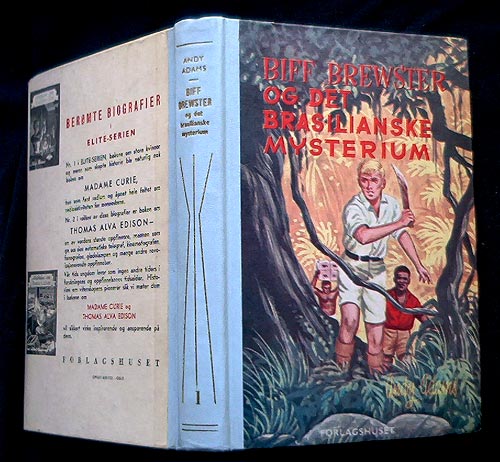

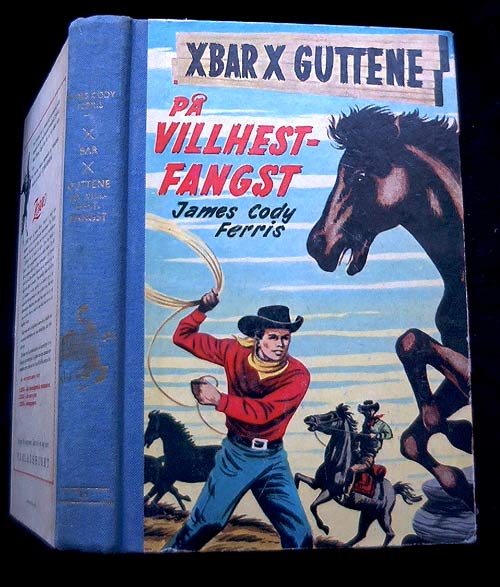


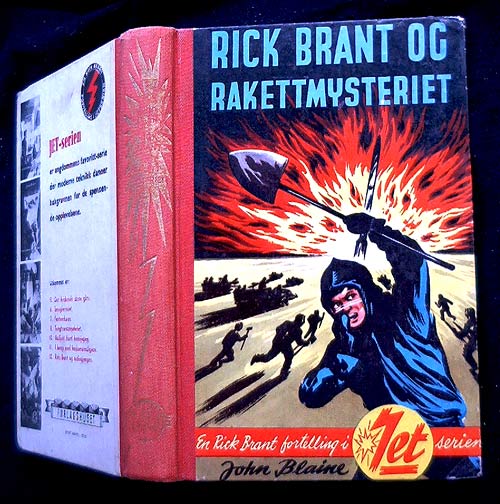
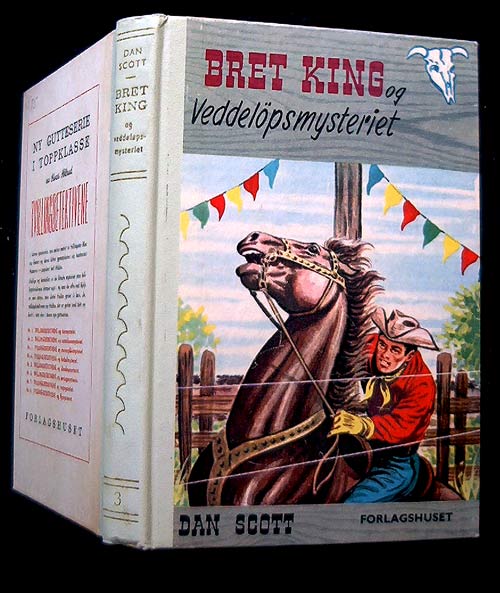

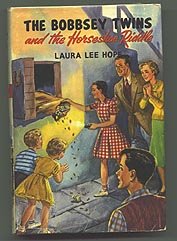
No comments:
Post a Comment